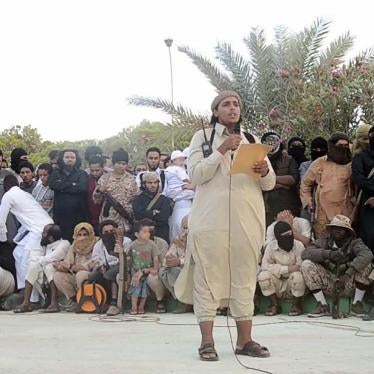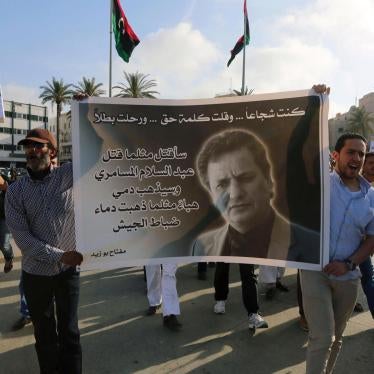(New York) - Libyan authorities should immediately release Jamal al-Haji, who was arrested after he submitted a complaint to the government about human rights violations, Human Rights Watch said today.
Al-Haji, who has written about human rights, is scheduled to appear on March 3, 2010, before the State Security Court, which does not meet fair trial standards. He is charged with "insulting judicial authorities," which under article 195 of the Penal Code carries a sentence of 3 to 15 years.
"Jamal al-Haji expressed his faith in the Libyan justice system by submitting a formal complaint," said Sarah Leah Whitson, Middle East director at Human Rights Watch. "To arrest him and then try him before an unfair court makes a mockery of that system."
Al-Haji's lawyer, Omar al-Habbasi, told Human Rights Watch that al-Haji appeared before the State Security court for the first time on February 17 without having been given access to a lawyer. Al-Haji at that time insisted that he be given access to a lawyer, and the judge adjourned the session until March 3 to allow him to obtain a lawyer. Al Habbasi said he has not yet been able to get access to any of the case documents and would ask the judge for an adjournment to allow him to study the case file.
Al-Haji's detention stems from a five-page complaint that he sent to Justice Secretary Mostafa Abdeljalil on May 24, 2009 about violations of his basic rights, including torture and inhumane conditions, while he was in custody from 2007 to 2009, and a refusal since his release to allow him to travel abroad. He also criticized Libya's lack of judicial independence, the interference of the security services in the judiciary, and the arbitrary detention of hundreds of people. Al-Haji had spent two years in prison as a political prisoner, convicted of "attempting to overthrow the political system" and "communication with enemy powers," for planning a demonstration in February 2007.
On November 5, the general prosecutor summoned al-Haji to respond to a criminal defamation complaint that the justice secretary had filed against him on June 4 concerning his May letter. On December 8, the prosecutor ordered al-Haji's detention in Jdaida prison in Tripoli pending trial. On December 9, the office of General Prosecutor Abdurahman Elabbar released a memorandum stating that it had "investigated the allegations in [al-Haji's] complaint and proved that they were untrue and therefore slanderous, which is punishable by law under article 195 of the penal code."
"Jamal al-Haji is a brave Libyan willing to risk publicly criticizing the government," Whitson said. "His arrest for 'insulting officials' violates his right to free expression."
Al-Haji writes regularly online about sensitive human rights issues such as the government's responsibility in the death in May of a prominent political prisoner, Fathi al-Jahmi. On September 1, al-Haji told BBC World television: "It is disaster for Libya to have this regime for 40 years. There is no freedom here; there is no democracy. The UK, France, Italy, I don't know why they support this dictatorship. But we will never forget."
Human Rights Watch has serious concerns about the State Security Court because it does not provide the right to appeal or protect the rights of defense. The court's decisions are not publicly available to the defendants, their families or, frequently, to their lawyers. Former defendants before this court told Human Rights Watch that they were allowed no opportunity to appeal.
The Internal Security Agency prevents lawyers from accompanying their clients during interrogations, and the lawyers are often unable to get access to the case files necessary to prepare their defense. In its first annual report released on December 10, 2009, the Human Rights Society of the Gaddafi Foundation run by Saif al-Islam al-Gaddafi, the son of the Libyan Leader, Mu'ammar el-Gaddafi, criticized the State Security Court and said it should be abolished.
"The authorities should quash the sentences of all prisoners sentenced after unfair trials before the People's Court and the State Security Court or retry them in a court that provides full due process guarantees," Whitson said.
As party to the International Covenant on Civil and Political Rights, Libya is obliged under article 14 to provide fair trials. This includes ensuring that the rights of defense are fully respected to ensure equality with the prosecution and that every defendant is granted the right to appeal. The court must also ensure that confessions obtained under torture are not accepted as evidence in the courtroom.
Human Rights Watch opposes the creation of special courts to try national security crimes. Such courts typically lack respect for the rights of defendants. Trials should be conducted before the normal criminal courts with all the procedural guarantees in international law.






